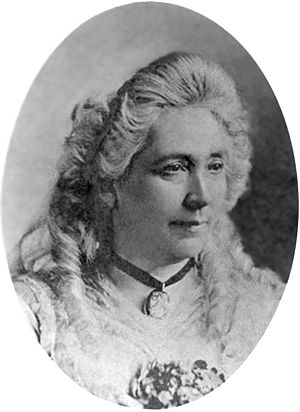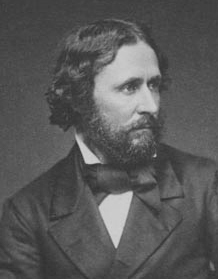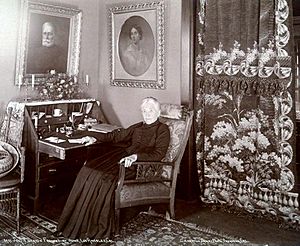Jessie Benton Frémont facts for kids
Quick facts for kids
Jessie Benton Frémont
|
|
|---|---|

Photo taken in 1876
|
|
| Born |
Jessie Ann Benton
May 31, 1824 |
| Died | December 27, 1902 (aged 78) Los Angeles, California
|
| Spouse(s) | John C. Frémont |
| Signature | |
Jessie Ann Benton Frémont (born May 31, 1824 – died December 27, 1902) was an important American writer and political activist. She was the daughter of Missouri Senator Thomas Hart Benton. She was also the wife of John C. Frémont, who was a military officer, explorer, and politician.
Jessie wrote many stories for popular magazines and several history books. Her writings helped her family when they had money troubles. Her books were often about her experiences living in the American West. Jessie strongly supported her husband. He became one of the first two senators for the new state of California. He was also a governor of the Territory of Arizona. Jessie spoke out on political issues and was strongly against slavery. Slavery was not allowed when California became a state.
Contents
Early Life and Education
Jessie Ann Benton was born on May 31, 1824, near Lexington, Virginia. She was the second child of Thomas Hart Benton and Elizabeth McDowell. Her father, Senator Benton, had wanted a son. But he named her after his own father, Jesse Benton.
Jessie grew up in Washington, D.C. She was educated more like a boy than a girl in the 1800s. Her father, known as the "Great Expansionist," taught her himself. He introduced her to important politicians of the time. This was very unusual for girls back then. Jessie was very close to her father. She often traveled with him. He shared his many books and maps with her. She began to share his dream of a nation stretching from the Atlantic to the Pacific Ocean.
Because of this, Jessie became very knowledgeable. She learned a lot about how society works, politics, history, and literature. She also learned several languages. After becoming fluent in French and Spanish, Jessie helped translate government documents.
In 1840, when she was 16, Jessie was studying at Georgetown Seminary. There, she met Lieutenant John C. Frémont. He was in Washington working on a report about his explorations. These explorations were between the Missouri River and the northern U.S. border. Jessie and John became engaged. However, her parents did not want them to marry yet because of her young age.
Her father, Senator Benton, likely influenced the War Department. Frémont was ordered to explore the Des Moines River on the western frontier. Soon after he returned, Jessie and John were married on October 19, 1841.
Adventures in the American West
After they married, Jessie and John lived on Army posts for a while. Then, Frémont was given a new job. He was to explore the West. He also scouted land for the future growth of the U.S. territory. This assignment helped the couple become famous.
Jessie and her father became friends again. This happened when her father helped promote Frémont's famous explorations of the West. Senator Benton's sick wife persuaded him to accept the marriage. So, Jessie and John moved into the Benton family home. Frémont left his pregnant wife in the spring of 1842. He led his first expedition to mark trails out West. He returned just days before their first child was born. Elizabeth Benton "Lily" Frémont was born on November 15, 1842, in Washington D.C. After her birth, John left again. Jessie and the baby stayed behind.
Frémont became known as the "Pathfinder to the West." This nickname came from James Fenimore Cooper's novel, the Pathfinder. Jessie was very interested in the details of his trips. She became his recorder, writing notes as he described his experiences. She added exciting details to his official reports. She wrote and edited popular stories about Frémont's adventures. He explored the West with his scout, Kit Carson.
This became Jessie's favorite work. She helped the public understand her husband and his actions. People were very eager to learn about the opening of the West. These stories were written when the idea of Manifest Destiny was very popular. This idea was that the U.S. was meant to expand across the continent. People loved her narratives.
Her husband was involved in the taking over of California. This happened because of the Mexican-American War. He served as the 3rd Military Governor in 1847. During Frémont's court-martial, he tried to defend his actions in the Bear Flag Revolt. At this time, Jessie gave birth to a son, Benton Frémont. He was born on July 24, 1848, in Washington, D.C. The baby died within a year in St. Louis. Jessie blamed her husband's accuser, General Kearny, for her baby's death.
In 1849, Jessie and Lily took a difficult and dangerous ship journey to join Frémont in California. They got off the ship and crossed the Isthmus of Panama. Then, they boarded another ship to San Francisco. The Frémonts earned money from their gold mines. They built a home and became part of San Francisco society. Jessie was a politically informed woman. She was known for getting involved in city politics. She would discuss important issues with the men. She became a member of the Pacific Coast Women's Press Association.
Jessie's Political Influence
John C. Frémont served as a Senator from California from September 9, 1850, to March 3, 1851. Their third child, John C. Frémont Jr., was born on April 19, 1851, at Las Mariposas, California. While the couple visited Paris, France, their fourth child, Anne Beverly Frémont, was born on February 1, 1853. Anne died five months later, on July 11, in Washington, D.C. Their fifth and final child, Francis Preston Frémont, was born on May 17, 1855, in Washington.
In 1856, Frémont was chosen as the very first Republican candidate for President. This was because he was against slavery. Jessie played a very active role in the campaign. She gathered support for her husband. One campaign slogan said, "Frémont and Jessie too." However, her father was a lifelong Democrat. He refused to support her husband's run for president. This did not stop Frémont's supporters. They kept calling her the "first lady in the land." Her admirers used this title for her throughout her life.
Frémont received many votes from the Northern states. But he lost the election to James Buchanan. He did get more votes than the American Party candidate, Millard Fillmore. Frémont was not able to win the state of California.
In the years that followed, the couple moved several times. They lived in California, St. Louis, and New York. In 1861, she played an active role in California. She worked against the movement to leave the Union (Secession). She got Unitarian minister Thomas Starr King and writer Bret Harte to help her. When Lincoln made Frémont the Commander of the Department of the West in 1861, they returned to St. Louis.
Jessie Frémont was her husband's unofficial helper and closest advisor. They both believed that St. Louis was not ready for war. They thought it needed more soldiers and supplies. They both pushed Washington to send more help. Jessie worked hard for the war effort. She helped start a Soldier's Relief Society in St. Louis. She also became very active in the Western Sanitary Commission. This group provided medicine and nursing to soldiers injured in the war.
One of the most impressive things she did in her political life happened during the Civil War. Frémont lost his position for issuing his own order of emancipation. This order freed all the slaves in Missouri. It happened before Lincoln's own Emancipation Proclamation. Jessie actually traveled to Washington. She spoke with Lincoln to help her husband, but it did not work.
Later Years and Legacy
The Frémonts did not live in St. Louis again. They moved to New York and then California. In the Panic of 1873, John C. Frémont lost all his money. He had invested a lot in railroad stock. He declared bankruptcy. Even with their money problems, Jessie started writing books to help support the family. These included A Year of American Travel: Narrative of Personal Experience (1878). This book was about her journey to California in 1849. She also wrote Souvenirs of My Time (1887).
From 1878 to 1881, John C. Frémont served as Governor of the Territory of Arizona. He was allowed to resign from the Army with a pension. Three months later, he died in 1890 in a hotel in New York.
After her husband died, the Congress recognized his important work. They gave Jessie a widow's pension of $2,000 a year. In 1891, she moved into a home in Los Angeles. A group of ladies from the city gave it to her. It was a sign of their great respect. She stayed healthy until about two and a half years before her death. An accident made her unable to walk. But she could use a wheelchair and enjoy being outdoors.
Jessie Benton Frémont died at age 78 at her home in Los Angeles on December 27, 1902. A large box of beautiful roses was sent by Mrs. James A. Garfield, a former first lady. Her funeral was held on December 30, at Christ Church. She was cremated, and her ashes were interred in Rosedale Cemetery.
In 1960, actress Lorna Thayer played Jessie Frémont in a TV episode called "The Gentle Sword." It was part of the show Death Valley Days. In the story, the Frémonts are in California during the gold rush. They get involved in a dispute over a mining claim. Mrs. Frémont bravely stands up to people trying to steal the claim.
Jessie's Writings
Jessie Benton Frémont wrote several books and many articles. Her writings often shared her experiences and supported her husband's work.
- The Story of the Guard: A Chronicle of the War (1863)
- A Year of American Travel: Narrative of Personal Experience (1878)
- Souvenirs of My Time (1887)
- Far-West Sketches (1890)
- The Will and the Way Stories (1891)
- The Origin of the Frémont Explorations (1891)
The book Memoirs of My Life (1887) by John C. Frémont includes a section called Sketch of Senator Benton written by Jessie Benton Frémont.
Her letters also offer insights into her thoughts and feelings throughout her life. These include her husband's presidential campaign, her role in the Civil War, and her time as First Lady of the Territory of Arizona.
Books About Jessie
Many authors have written books about Jessie Benton Frémont's life.
- Jessie Benton Frémont: A Biography (1987) by Pamela Herr
- Jessie Benton Frémont: A Woman who Made History (1995) by Catherine Coffin Phillips
- Jessie Benton Frémont: Missouri's Trailblazer (2005) by Ilene Stone and Suzanna M. Grenz
- Passion and Principle: John and Jessie Frémont, the Couple Whose Power, Politics, and Love Shaped Nineteenth-century America (2007) by Sally Denton
- Imperfect Union: How Jessie and John Fremont Mapped the West, Invented Celebrity and Helped Cause the Civil War, (2020) by Steve Inskeep
In Fiction
- Immortal Wife: The Biographical Novel of Jessie Benton Frémont (1944) by Irving Stone
- Dream West is a 1982 historical novel by David Nevin about Charles and Jessie Frémont. It was made into a 1986 TV miniseries with the same name.
See also
 | Isaac Myers |
 | D. Hamilton Jackson |
 | A. Philip Randolph |



